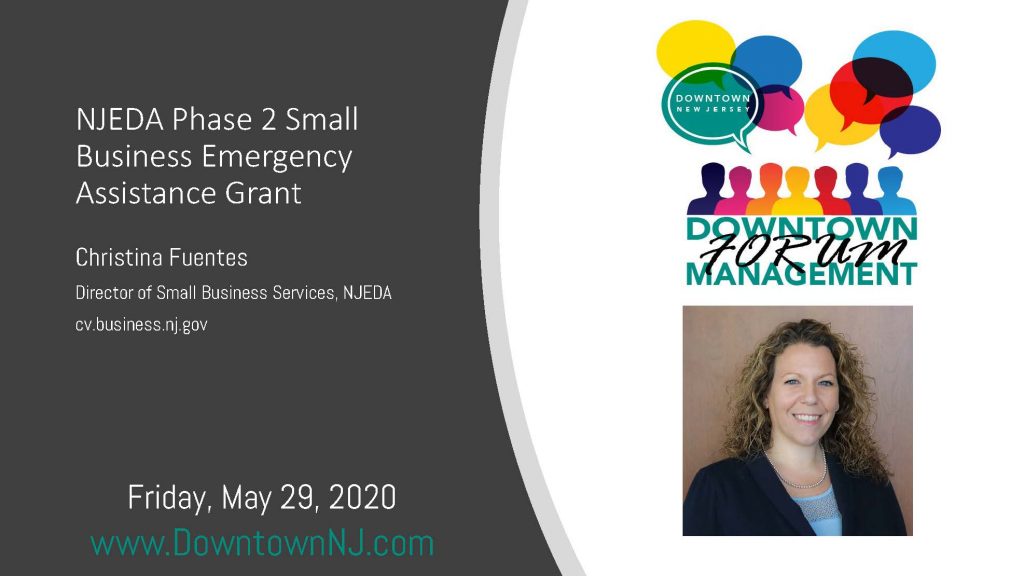NJEDA Phase 2 Small Business Emergency Assistance Grant
Courtenay D. Mercer, PP, AICP
Executive Director, Downtown New Jersey
Rachael Thompson Panik
Associate Planner, Mercer Planning Associates
May 29, 2020
Downtown New Jersey provided a series of virtual opportunities for downtown managers, economic development professionals, and public officials to exchange ideas about best practices related to downtown economic development in light of the COVID-19 crisis.
On May 22nd, the NJEDA Board approved an additional $45 million in funding to small businesses from the State’s federal CARES Act allocation. At this forum, Christina Fuentes, Director of Small Business Services at NJEDA shared information about eligibility and applying for Phase 2 of the Small Business Emergency Assistance Grant Program.
View PowerPoint>
The initial phase of Small Business Emergency Assistance Grant Program was $5 million, and those funds were exhausted the day the application opened. Due the high number of applicants to Phase 1 funding, many applicants were told immediately that they were waitlisted. The NJEDA has now allocated an additional $50 million of CARES Act funding to the program, $5 million of that will be used to fund grants to those businesses that were waitlisted during Phase 1.The Phase 2 program is meant to help a broader group of businesses. Phase 1 grants were limited to specific NAICS codes, but Phase 2 does not have a NAICS limitation and is also available to non-profit organizations and sole proprietors/1099 contractors. The NJEDA is allocating $45 million for Phase 2, $15 million of which is reserved for businesses in eligible Opportunity Zone Census Tracts (OZs). Those applying in these OZs will apply through the same process, and NJEDA will identify which applicants are eligible on the backend.Phase 2 provides operating expense grants of $1,000 per employee up to $10,000 to small businesses. Requirements are as follows:- The small business must have a physical location in the State of New Jersey (home-based businesses are included).
- The business must have 25 or fewer full-time employees (FTE), as per the business’s most recent NJ-WR30 filing with the Department of Labor.
- Part-time employees can be “combined” to equal an FTE, and 1099 contract workers can be included in the worker count.
- Non-profit entities with 501(c)(3), 501(c)(4), and 501(c)(7) are eligible.
- The application will require self-certification that the business has material financial needs that cannot be overcome without the grant of emergency funds.
- Businesses that were approved under Phase 1 for 10 or fewer FTE, may apply again for any employees between 10 and 25.
- Those that received Small Business Administration (SBA) Paycheck Protection Program (PPP) and/or Economic Injury Disaster Loan (EIDL) are eligible for the grant, but should not claim the use of the funds for the same purposes (e.g. do not pay employees for the same period being claimed for SBA , and/or use it for another operating expense altogether).
Q&A (related to the Phase 2 Grant)
Will childcare centers be eligible in this wave of applications?- There are not any NAICS requirements with the Phase 2 grants.
- Organizations that have registered with the NJ Division of Revenue and file an annual report (this is not the same as filing taxes). You can check the NJ Business Records Service to determine if your organization is registered.
- You will be able to view a sample application on June 1st. Not much is required, as NJEDA will be doing background and taxation checks. If there are issues with the documentation, there will be a quick appeals process in place to help those that were unduly declined overturn their declination to become approved.
- As long as it is a registered business with a location in the state, it is eligible.
- No, but applicants must make sure that they do not duplicate benefits. Because NJEDA receives federal funding through the CARES Act and the PPP is also funded through the CARES Act, benefits cannot be duplicated. Businesses must use the Phase 2 grant different than they have used any other grant dollars they have received. Businesses should be sure that they can demonstrate how they used the funds.
- Qualifications are based only on full-time equivalent employees.
- No, unless there are additional employees over the original 10 limit that you would be eligible to apply for. Businesses that were approved/wait listed under Phase 1 for 10 or fewer FTE, may apply again for any employees between 10 and 25.
- Yes, they are eligible for the minimum amount of $1000.
- No, as long as benefits are not duplicated from any previously received SBA funds.
Small Business Emergency Loan Program
NJEDA also launched a Small Business Emergency Assistance Loan program, which went live on April 13th. Unfortunately, funds for this program have been exhausted. Businesses can check the status of their application on the NJEDA website.CDFI Emergency Loan Loss Reserve Fund
This $10 million reserve fund provides backing to Community Development Finance Institution (CDFI) loans in case of default, thus enabling the CDFIs to provide more loans at lower interest rates. These loans provide working capital to micro and small businesses at interest rates lower than 3.75% for a term not to exceed 5 year. The loans can include flexible repayment provisions (e.g. deferred, interest only, etc.). CDFI Emergency Loan programs include:- New Jersey Community Capital (NJCC): Up to $75k at 3% interest rate without a collateral requirement.
- Union County Development Corporation (UCEDC): They are offering 0% loans.
- Regional Business Assistance Corporate (RBAC)
- Cooperative Business Assistance Corporation (CBAC): Represent the 7 southern counties and are offering working capital loans up to $20k.
- Greater Newark Enterprise Corporation (GNEC): Will be ready in a couple weeks and is a Newark specific program.
- 1st Bergen Federal Credit Union: Will ready in the next couple weeks.
NJ Technical Assistance Support
the NJEDA provided financial support to the following organizations to provide technical support to businesses applying for federal assistance from Small Business Administration (SBA) programs: African American Chamber of Commerce of New Jersey (AACCNJ), New Jersey State Veterans Chamber of Commerce, Rising Tide Capital, Statewide Hispanic Chamber of Commerce of New Jersey (SHCCNJ). The assistance incudes preparing financial information, packaging application documentation, and completing and submitting the online or paper-based application.Traditional NJEDA Loan Products
In addition to these pandemic-specific funds and loans, NJEDA continues to provide its traditional loans to support small businesses:- Micro-Business Loan: Businesses can receive up to $50,000 for working capital or equipment. These are low-interest, flexible term loans for for-profit businesses that have less than $1.5 million in revenue yearly and 10 or fewer full-time employees.
- Small Business Fund: Loans up to $500,000 for businesses and non-profits that have less than $3 million annual revenue.
- Direct Loan: Eligible businesses can receive up to $2 million for fixed assets, and up to $750,000 for working capital. To be eligible, businesses must create and retain one full-time job for every $65,000 within two years.
Personal Protective Equipment
The State created a PPE Wholesale Supplier Registry Public Listing to help connect businesses with suppliers of personal protective equipment (PPE) that can help prevent the spread of COVID-19. The database is updated several times per week and is easily filtered by product type and product specification.NJ Restart and Recovery Advisory Council
State government officials are bringing together leaders from diverse industry groups and community organizations throughout New Jersey to advise state leadership on economic matters impacted by COVID-19. The council is made up of several subcommittees that advise on different topics, including the Main Street Committee (on which Downtown New Jersey is serving).Additional Resources
- New Jersey COVID-19 Business Information Hub
- Emergency Assistance Eligibility Wizard
- Grant Award Size Estimate Calculator
- New Jersey COVID-19 Jobs and Hiring Portal
- Job Portal
General Discussion and Q&A
Many BIDs do not want to apply for the Small Business Assistance Grants because they do not want to compete with their small businesses for the funding. However, BIDs are realizing a loss of revenue due to cancelled events and anticipation that some property owners will not be able to pay their assessments. The group discussed other alternatives:- Reinstating the DBIZ Program, which has just under $2 million available to lend. Unfortunately, the program has been dormant since FY17.
- BIDs could also consider applying for the CDFI loans (particularly those serving loan and moderate-income areas), or NJEDA’s Small Business Fund product.
- NJEDA would like to have a listening session with DNJ leadership to learn more about the capacity and needs of BIDs.
- Guidance about how to reopen will be released at least 2 weeks prior so businesses can prepare.



